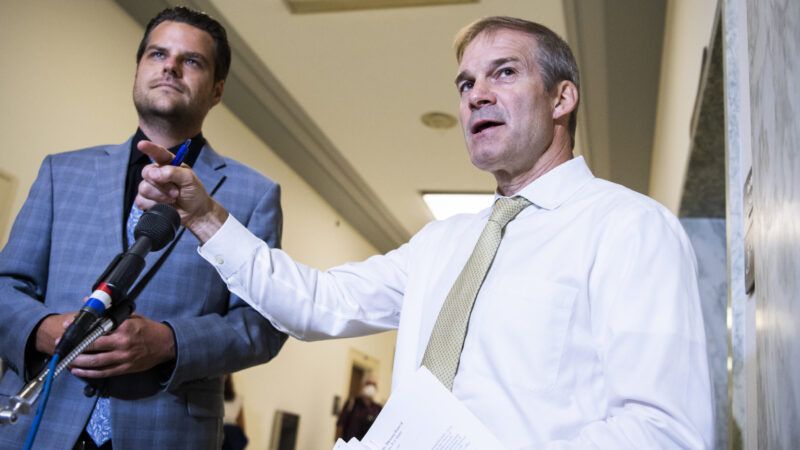The House Freedom Caucus Just Trashed What Little Credibility It Had Left
More than 100 members of Congress signed a petition asking the U.S. Supreme Court to overturn the presidential election, including several prominent members of the group founded to protect "the rule of law."

When the House Freedom Caucus was formed in January 2015, co-founder Rep. Jim Jordan (R–Ohio) said that the unofficial congressional club would "support open, accountable and limited government, the Constitution, and the rule of law."
On Thursday, roughly two-thirds of the House Freedom Caucus, including Jordan, signed an amicus brief in support of President Donald Trump's longshot bid to have the U.S. Supreme Court overturn the outcome of the 2020 presidential election, which Trump plainly lost.
The amicus brief will likely have little bearing on the outcome of the case, which hinges on the unprecedented claim that one state should be allowed to challenge how other states handle elections. In a more serious amicus brief also filed on Thursday, a group of conservative legal scholars described the underlying lawsuit as making "a mockery of federalism and separation of powers."
The amicus brief filed by 106 members of Congress—all Republicans, naturally—isn't a serious legal document so much as an oath of loyalty to Trump. It is a convenient list of the members of Congress who chose unconditional fealty to a president's bizarre, flailing attempt to hold onto power for its own sake over the Constitution and rule of the law.
⚖️JUST IN: New amicus brief from 106 Republican House members in support of Texas' bid to overturn President-elect Joe Biden's win in the Supreme Court. Here they are???? pic.twitter.com/QLN4jDfoto
— John Kruzel (@johnkruzel) December 10, 2020
Don't heap all your scorn on Jordan. He has plenty of company. Current House Freedom Caucus Chairman Rep. Andy Biggs (R–Ariz.) also signed the amicus brief.
By my unofficial count, there are 20 current House Freedom Caucus members—the group does not disclose an official list of members, so I used Ballotpedia's list—whose names appear on the brief. In addition to Biggs and Jordan, they are Rep. Mo Brooks (R–Ala.), Rep. Ken Buck (R–Colo.), Rep. Ted Budd (R–N.C.), Rep. Ben Cline (R–Va.), Rep. Michael Cloud (R–Texas), Rep. Russ Fulcher (R–Idaho), Rep. Matt Gaetz (R–Fla.), Rep. Louie Gohmert (R–Texas), Rep. Mark Green (R–Ariz.), Rep. Andrew Harris (R–Md.), Rep. Debbie Lesko (R–Ariz.), Rep. Alex Mooney (R–W.Va.), Rep. Ralph Norman (R–S.C.), Rep. Gary Palmer (R–Ala.), Rep. Scott Perry (R–Pa.), Rep. Randy Weber (R–Texas), Rep. Ron Wright (R–Texas), and Rep. Ted Yoho (R–Fla.).
It is not breaking news that the House Freedom Caucus, once considered the closest thing Congress had to a libertarian club, has become an appendage of the Trump White House. More than two years ago, Reason's Matt Welch noted that the group had seemingly lost interest in the gadfly role it had so eagerly adopted during President Barack Obama's two terms in office.
Since then, the group's credibility has only fallen further. Members of the House Freedom Caucus led the campaign to banish Rep. Justin Amash (L–Mich.), a co-founder of the group, from the Republican Party after he had the temerity to suggest that Trump should be impeached. The Wall Street Journal described the (now Amash-less) group as "Trump's de facto defense team" during the impeachment hearing.
That so many of its members signed onto an amicus brief asking the Supreme Court to throw out the election results is a new low for the House Freedom Caucus as an entity. For the individual members of Congress who signed it, the amicus brief should stand as a permanent reminder that they have no principles beyond doing what Trump asks.
"It's disappointing to me that so many members of Congress who professed to 'support open, accountable and limited government, the Constitution and the rule of law' have become nothing more than a Praetorian Guard for Trump, who supports none of those things," David Boaz, executive vice president of the Cato Institute, and a longtime observer of libertarian politics, told Reason in response to a question about House Freedom Caucus members endorsing the amicus brief. "Those members of Congress who should have been the most committed to free markets, limited government, and American values have sadly been the most enthusiastic about following him down that destructive path."
The next time Jordan or Biggs or Gaetz or any of the other signatories listed above talks about the value of limited government, the importance of the constitution, or the primacy of the rule of law, they will perhaps be right in the way that a stuck clock is right twice a day. But they are demonstrating right now that Trump's interests come before all of that.


Show Comments (390)